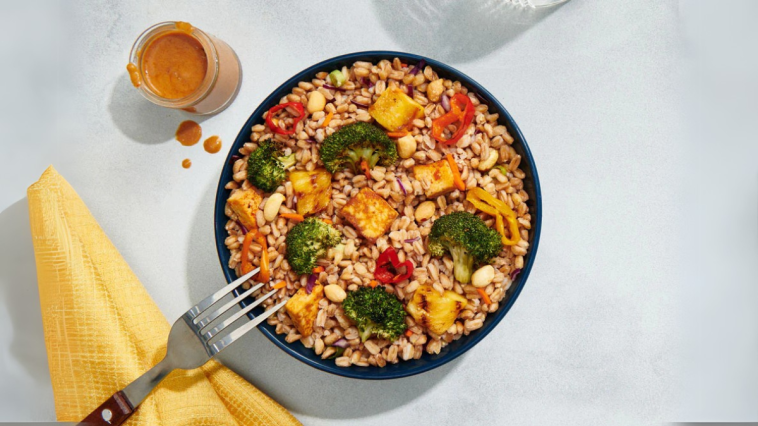Collagen is crucial for healthy skin, strong joints, and a resilient body. However, traditional collagen supplements are animal-based. But, what about vegans who can not use such animal-based products?
Keep in mind that you don’t only need animal-derived products to maintain your collagen levels. With the right vegan collagen sources and smart lifestyle habits, you can support your body’s natural collagen production while staying true to your plant-based principles.
Here’s how you can easily boost your collagen on a vegan diet with these simple hacks.
What is Collagen and Its Role?
Collagen is a structural protein that makes up a significant part of your skin, hair, nails, bones, and connective tissues. It is so important because it produces collagen naturally and also slows down the process of aging. There are many factors like sun exposure, stress, and poor nutrition that can further accelerate collagen depletion.
The most trending vegan diet comes with challenges. The most important one to mention here is the absence of direct collagen sources. Collagen itself is not vegan since it’s derived from animal parts, but you can still stimulate its production with plant-based nutrients.
Hack 1 – Prioritize Vitamin C-rich Foods
Vitamin C is essential for collagen synthesis as it helps the body convert proline and lysine—two amino acids—into collagen. For this purpose, you should incorporate fruits and vegetables such as oranges, kiwis, strawberries, bell peppers, and broccoli into your meals for an excellent start.
Smoothies that are made with spinach, mango, and lemon juice are a refreshing way to pack in Vitamin C. Remember, all of these methods will help you boost your collagen naturally.
Hack 2 – Focus on Proline and Glycine Sources
Proline and glycine are amino acids vital for collagen production. On a vegan diet, you can find them in foods like legumes, soy products (tofu, tempeh), pumpkin seeds, and quinoa. These vegan collagen sources are easy to integrate into everyday meals like stir-fries, salads, or grain bowls.
Hack 3 – Add Silica-Rich Foods
Silica is another mineral that supports collagen production and promotes skin elasticity. Foods like bananas, oats, and leafy greens are excellent sources.
That is why, it is a great approach to switch to whole-grain oats for breakfast. You can also add greens to your lunch for a big difference over time.
Hack 4 – Don’t Forget Zinc and Copper
Zinc and copper are trace minerals that help enzymes involved in collagen synthesis function effectively. Zinc can be found in pumpkin seeds, chickpeas, and lentils, while copper is abundant in nuts like cashews and almonds.
Therefore, you should snack on these or you can also include them in plant-based recipes for a double boost.
Hack 5 – Use Vegan Collagen Supplements
While whole foods are essential, vegan collagen supplements can be a convenient addition to your routine. These supplements don’t contain collagen itself but are formulated with nutrients like Vitamin C, silica, and plant-based amino acids that stimulate collagen production.
Powdered vegan collagen sources can be mixed into smoothies, coffee, or soups, making them a versatile option for busy lifestyles. It is also important for you to know that Plant-based collagen peptides are one of the best options for people who need collagen but are vegetarians.
Hack 6 – Incorporate Antioxidant-Packed Foods
Oxidative stress from environmental factors can break down collagen faster. To counteract this, include antioxidant-rich foods like berries, green tea, and dark chocolate in your diet.
These not only protect existing collagen but also support overall skin health.
Hack 7 – Stay Hydrated
Collagen needs a hydrated environment to function properly. Drinking enough water helps maintain skin elasticity and aids in the efficient production of collagen. Pair hydration with water-rich foods like cucumbers and watermelon for added benefits.
Hack 8 – Limit Sugar and Processed Foods
Excess sugar binds to proteins in your skin, forming harmful compounds that degrade collagen. Reducing sugar intake and focusing on whole, unprocessed foods ensures that your collagen levels remain optimal.
Hack 9 – Include Fermented Foods
Fermented foods like sauerkraut, kimchi, and kombucha promote gut health. This is why they are directly linked to better nutrient absorption.
Remember a healthy gut is important for your body. It ensures that the vegan collagen sources you consume are utilized efficiently.
Hack 10 – Protect Your Skin from the Sun
UV rays accelerate collagen breakdown, so don’t skip sunscreen—even on cloudy days. That is why it is great to pair sun protection with a diet rich in vegan collagen sources to maintain youthful, glowing skin.
Concluding Thoughts
Collagen on a vegan diet depends on how much you focus on the right nutrients and lifestyle habits. By incorporating vegan collagen sources like Vitamin C, proline-rich foods, and supplements into your daily routine, you can support your body’s natural collagen production without compromising your values.
All you need to do is stay consistent with these hacks to enhance your skin, hair, and nails. With an additional perk of stronger joints and overall health. So, follow these tips now to let your vegan diet pave the way for a collagen-rich, vibrant you!




